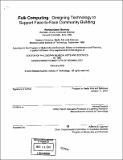Folk computing : designing technology to support face-to-face community building
Author(s)
Borovoy, Richard Daniel
DownloadFull printable version (19.96Mb)
Other Contributors
Massachusetts Institute of Technology. Dept. of Architecture. Program in Media Arts and Sciences.
Advisor
Mitchel Resnick.
Terms of use
Metadata
Show full item recordAbstract
Creating common ground in a community of people who do not all know each other is a chicken-and-egg problem: members do not share enough common ground to support the kinds of conversations that help build it. "Folk Computing" technology is designed to help build community in informal, face-to-face settings by giving users a playful way of revealing shared assumptions and interests. Drawing on the communicative process of folklore, Folk Computing devices facilitate the creation, circulation and tracking of new, digital forms of lore. These digital folklore objects serve as social probes: they circulate among people with whom they resonate, thereby revealing the boundaries of groups who share the underlying beliefs, knowledge and experiences that give the lore meaning. Folk Computing uses technology to enhance the community building functions of folklore in three important ways: it supports the circulation of more interactive and media-rich lore, it reduces the social and cognitive costs of folklore creation and circulation, and it enables detailed visualizations of how pieces of lore circulate through a community. This thesis will explore the potential of Folk Computing through a design rationale for three new technologies, ranging from computationally augmented name tags used at conferences (the Thinking Tags and Meme Tags) to devices with which people can create, trade and track animations and simple games (the i-balls), used over several weeks by the population of a K-8 public school.
Description
Thesis (Ph. D.)--Massachusetts Institute of Technology, School of Architecture and Planning, Program in Media Arts and Sciences, 2002. Includes bibliographical references (leaves 119-122).
Date issued
2002Department
Program in Media Arts and Sciences (Massachusetts Institute of Technology)Publisher
Massachusetts Institute of Technology
Keywords
Architecture. Program in Media Arts and Sciences.
